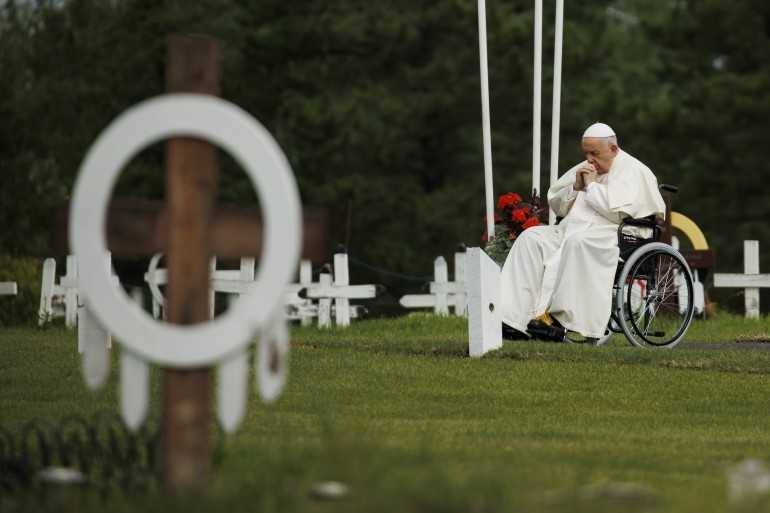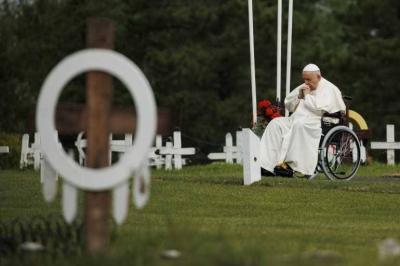With Pope Francis returning from his "apology" trip to Canada and the Vatican announcing a visit to Kazakhstan in September, questions are arising in Lebanon about the status of the trip initially scheduled for June to Beirut, which was postponed due to the Pope's health condition. Informed sources familiar with papal visits reported to "Al-Markaziah" that the Lebanon visit has been indefinitely postponed, with no new date set and it is not even listed on the announced itinerary, although it has not been canceled. The reasons for the postponement are numerous, including health-related issues that also led to the postponement of his visits to Congo and South Sudan. Furthermore, the Pope returned from Canada feeling tired after a relatively long visit. Additionally, he is preparing to appoint new cardinals at the end of August, and starting from October onward, the Vatican will be engaged in church-related commitments that require the Pope's personal attendance.
The Pope, who is 85 years old, is experiencing health issues related to a knee injury and mentioned to reporters on his flight back from Canada that he could barely take a few steps and spent most of his time in a wheelchair. He spoke about the possibility of stepping down from his position but stated, “not now.” He added, “I don’t think I can maintain the same pace of travel as before.” He noted that the knee problem can only be resolved through surgery, which he is reluctant to undergo again after past surgery for colon issues just over a year ago. He expressed a desire to continue traveling but indicated that future trips may need to be planned on a slightly smaller scale.
"Al-Markaziah" reported that the Pope chose not to cancel the Canada trip due to its importance and what it meant for the Holy Father to apologize for the tragedy that occurred between the late 19th century and the 1990s, involving the forcible enrollment of many Indigenous children in government-funded residential schools, most of which were run by the Catholic Church, after separating them from their families, language, and culture. The Kazakhstan trip, on the other hand, is short and is for participation in a conference on interfaith dialogue from September 13 to 15. Matteo Bruni, director of the Holy See Press Office, stated that the Pope "will travel to Kazakhstan to visit the city of Nur-Sultan on the occasion of the seventh conference of world and traditional religious leaders." This marks the first time a Pope will personally attend this conference, although the Vatican has previously been represented by delegates.
While the Pope wishes to visit Lebanon, circumstances, particularly his health status and the unstable situation in Lebanon—marked by a caretaker government and pending presidential elections—might prevent such a visit. However, this does not indicate a lack of interest in the country; he frequently raises Lebanon's issues, including during the significant meeting held for the leaders of churches in Lebanon, which he attended in July with senior aides. The Vatican does not hold press conferences or make speeches to announce its actions but works quietly. It continues to provide economic assistance to Lebanon through social and educational aid, as well as addressing Lebanon's crisis with active nations, especially France and the United States.
Regarding Bishop Moussa el-Hage, concerned circles clarified that the Vatican has a clear and principled position that fully supports the church and Maronite Patriarch Cardinal Mar Beshara Boutros al-Rahi regarding non-interference with any clergy. Should any issues arise, the first recourse is to the patriarchate and then to the Vatican, because it adheres to the ecclesiastical law recognized by Lebanon. It is noted that the papal ambassador to Lebanon, Joseph Spiteri, has been transferred to Mexico, with the end of his service in Lebanon due in September and no new ambassador appointed yet. Additionally, the diplomatic assistant at the embassy has been replaced by another diplomat who will soon move to Lebanon after serving in Colombia.
The Vatican has not and will not cease its support for Lebanon, providing aid in health, education, and humanitarian matters through charitable institutions. Its political or diplomatic stance aligns with the international community's call for reforms first to enable not just engagement with Lebanon but also to restore confidence and take steps toward assistance or investment. Lebanon must recognize that each passing day worsens its conditions, especially after the Russian-Ukrainian war or the potential provocations of China-Taiwan that could ignite conflict. What the world could have offered two years ago differs from what it can today or tomorrow, and delays make matters more challenging. The ball is in Lebanon's court; will the officials take it? conclude the sources.




